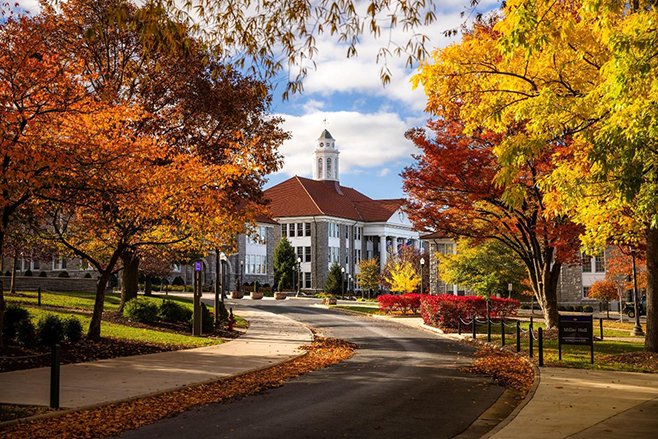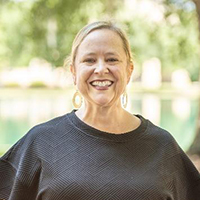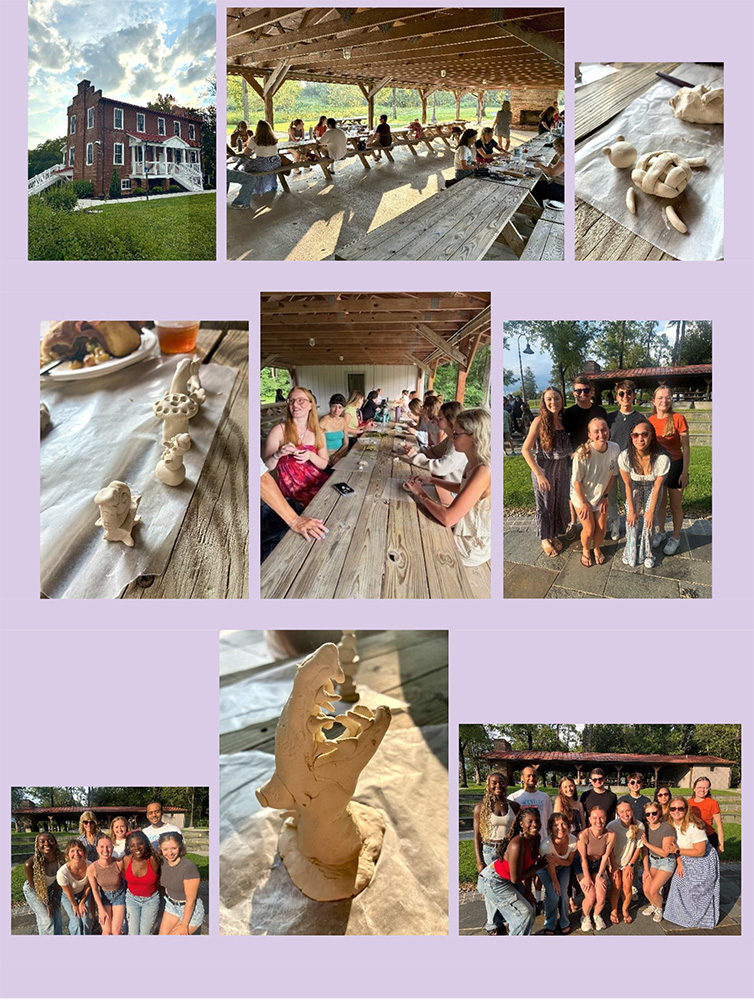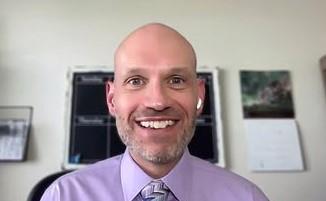
Welcome to the Fall Semester!

Welcome to a new academic year! Our students have already enjoyed Orientation on August 19th, and our Department Picnic at JMU Farm! In this issue, we welcome our newest faculty member Dr. Viki Kelchner, learn about upcoming information sessions, review our Fall Calendar, celebrate Dr. Brian Lusk in our Alumni Spotlight, and explore campus resources that might be helpful to your success as a JMU graduate student.
Timely Counseling News

Welcome Dr. Viki Kelchner to Counseling and Supervision
Dr. Viki P. Kelchner serves as an Associate Professor of Counselor Education in the Department of Graduate Psychology at James Madison University. She is a Licensed Professional Counselor, Licensed Professional Counselor Supervisor, National Board-Certified Counselor, and Certified School Counselor. Dr. Kelchner’s research and publications focus on supporting families, neurodivergent individuals and their families, and high-needs youth through community-based and school-based family services and intervention programs. Her work emphasizes inclusive, evidence-based approaches to mental health wellness and family support.
Upcoming Program Info Sessions
If you’re curious about what you can do with a master’s degree in Clinical Mental Health, or a doctorate in Counseling and Supervision - and better understand the academic rigor associated with each – these sessions sponsored by JMU’s The Graduate School are an excellent source of information. Register today!
September is National Recovery Monday: “Recovery is REAL (Restoring Every Aspect of Life)”
SAMHSA, as well as many other organizations, has information regarding recovery, including factsheets and resources. You can learn more on SAMHSA’s website.
Graduate Psychology Annual Welcome Picnic
Graduate Psychology hosted their annual “Back to School” picnic at JMU Farm on Sunday, August 24th. In addition to delicious BBQ delights like hamburgers, hot dogs, potato and macaroni salads, cornbread, and dessert – students, staff and faculty made keepsakes from air-dry clay!

Counseling Programs Calendar
|
|
August |
|
8/19 |
Counseling Programs Orientation, Miller G012, 12-2pm |
|
8/20 |
First day of classes |
|
8/24 |
Department of Graduate Psychology Welcome Picnic (JMU Farm) |
|
|
September |
|
9/1 |
Counseling Programs Meeting in Johnston Hall |
|
9/4 |
Department Leadership Council (DLC) Meeting in Johnston Hall |
|
9/8 |
Graduate Psychology Department Meeting in Miller Hall |
|
9/15 |
Pizza & Process in Miller Hall |
|
9/17-20 |
Counseling & Supervision 1st Fall Residency |
|
9/17 |
Info Session: Clinical Mental Health Counseling M.A./Ed.S. Program |
|
9/18-19 |
Applied Suicide Intervention Skills Training (ASIST) |
|
9/22 |
Info Session: Counseling & Supervision Ph.D. Program |
|
9/30 |
Graduate & Professional School Fair at Hotel Madison (3-6pm) |
|
|
October |
|
10/1 |
Apply for Spring/Summer 2026 Graduation |
|
10/2 |
Department Leadership Council (DLC) Meeting in Johnston Hall |
|
10/6 |
Counseling Programs Meeting in Johnston Hall |
|
10/8-12 |
Association for Counselor Education and Supervision (ACES) Conference – Pittsburgh, PA |
|
10/9 |
Last day to submit an application for a Masters, Ed.S. or Doctoral degree if graduation requirements are to be met in May or August 2025 |
|
10/13 |
Graduate Psychology Department Meeting in Miller Hall |
|
10/22 |
Info Session: Counseling & Supervision Ph.D. Program |
|
10/22 |
CACREP Advisory Meeting |
|
10/22-26 |
Fall Break (No Classes – University Offices Open) |
|
10/29 |
Info Session: School Counseling M.Ed./Ed.S. Program |
|
10/31 |
IPE Seminar (School Counseling 2nd Years) |
|
|
November |
|
11/3 |
Counseling Programs Meeting in Johnston Hall |
|
11/3 |
Registration begins for Spring 2025 semester |
|
11/5-7 |
Counseling & Supervision 2nd Fall Residency |
|
11/6 |
Department Leadership Council (DLC) Meeting in Johnston Hall |
|
11/10 |
Graduate Psychology Department Meeting in Miller Hall |
|
11/10 |
Info Session: Counseling & Supervision Ph.D. Program |
|
11/13-15 |
Virginia Counseling Association (VCA) Conference in Norfolk, VA |
|
11/14 |
Comprehensive assessment results and EdS Thesis/Dissertation Committee Approval Form due to TGS for December 2025 graduation candidates |
|
11/24-28 |
Thanksgiving Break (No Classes – University Officies Closed) |
|
|
December |
|
12/4 |
Department Leadership Council (DLC) Meeting in Johnston Hall |
|
12/8 |
Graduate Psychology Department Meeting in Miller Hall |
|
12/6-12 |
Final Exams |
|
12/13 |
December Commencement Ceremony. |
|
12/22-1/1/26 |
Winter Break (No Classes - University Offices Closed 12/23-1/1/25) |
Resources
Need a Graduate Assistantship?
Be sure to check openings regularly on Student Employment at JMU. Additional openings are likely to be added throughout the semester and into the summer. Assistantships provide tuition remission plus a modest stipend to help cover living expenses.
Campus Services and Resources:
Several offices at JMU offer support for our graduate students:
- Business Office
- Center for Multicultural Student Services
- Communication Center
- Counseling Center
- Dining Services
- JMU Health Center (information on Covid testing, flu shots, and more
- JMU Inclusive Excellence
- JMU Libraries
- Office of Disability Services
- Off-Campus Housing
- The Pantry
- University Career Center
- University Recreation
Counseling Programs on Social Media
Counseling Organizations
If you’d like to keep abreast of what’s going on in the field this fall, be sure to check out:
- American Counseling Association and the
- Virginia Counselors Association, as well as its relevant divisions and chapters.
- American Mental Health Counselors Association
- American School Counselor Association
- Association for Counselor Education and Supervision
Alumni Spotlight
We continue our new feature that shines light on some of our recent alums. Read below to hear what they are up to and advice they have for current students!

Meet Dr. Brian Lusk (he/him)
What year did you graduate and from what JMU Counseling Program?
I completed my dissertation defense on November 1, 2024, and officially graduated in December 2024 from James Madison University’s Counseling and Supervision doctoral program.
What was your motivation to become a part of the Counseling and Supervision program?
I was motivated to join the Counseling and Supervision program because I wanted to challenge myself to grow both professionally and personally. Education is a lifelong journey, and pursuing a PhD was a way to deepen my skills, broaden my perspective, and keep opportunities open in the counseling field. I didn't want any doors in my career to be closed just because I hadn't taken the step to earn a doctorate.
What future do you see for yourself, utilizing your Ph.D.?
Looking ahead, I want to continue my career in higher education administration. Over the past six years in leadership roles, I have seen how essential it is to have professionals with a background in mental health shaping the student experience. Higher education is starting to recognize and value trauma-informed, holistic approaches, but there is still a long way to go in changing culture and mindset. My PhD allows me to contribute to this shift in meaningful ways. At the same time, I hope to stay connected to teaching by adjuncting in graduate programs whenever possible. Teaching has become an unexpected passion, and I find great meaning in mentoring future counselors and supervisors.
What are/were your particular research or practitioner areas of interest?
My interests focus on translating theory into practice, primarily studying how interventions work in real-world settings. My dissertation examined the effectiveness of EMDR in lowering performance anxiety among college athletes, an area where clinical techniques can have immediate effects on performance and well-being. Additionally, I am interested in improving the supervisory experience for those pursuing licensure and exploring ways to enhance counselor preparation and professional growth. More generally, I am dedicated to research and practice that directly benefits the counseling field and leads to better outcomes for the students and clients we serve.
What advice do you have for current students of the program?
My advice to current students is to fully embrace the challenge and lean into moments of discomfort because that's where the most growth happens. Take the program one day and one course at a time, keeping your eyes on the final goal but not so focused on the end that you miss the importance of each step. It's a journey that is both demanding and rewarding, and while finishing will feel exhilarating, you might also be surprised at how bittersweet it is when it’s over. Appreciate the struggle, celebrate the progress, and enjoy the ride.
What advice would you give to a prospective applicant?
For prospective applicants, I would advise entering the program prepared for it to be challenging, rigorous, and sometimes overwhelming, but also genuinely rewarding. Crossing the finish line and hearing “Doctor” in front of your name for the first time is a moment that makes every sacrifice worthwhile. More importantly, you will not be the same person at the end as you were at the start. The program pushes you to develop in ways that transform you both personally and professionally, and you emerge as a stronger, more polished version of yourself in almost every aspect of life. My additional advice is to approach the program with humility and openness, rely on your cohort and mentors, and remind yourself often why you started. It is not a journey you undertake alone, and the relationships you build along the way are just as meaningful as the degree itself.
Pizza and Process!
Pizza and Process offers students from all programs a chance to connect in- person with peers and faculty on an intentional and useful topic. Locations will be announced in the week leading up to each Pizza and Process. Here’s what you can expect:
- Connection. Catch up and check in with students and faculty whom you may not see regularly.
- Reminders. Faculty facilitators will review the calendar and offer recommendations for items to keep on your radar. Occasionally, alums or other members of our community may talk about professional opportunities like conferences, volunteering, and jobs.
- Learning. Each session brings a topic relevant to current events happening in the counseling field.
- Questions. Everyone will have an opportunity to ask questions in all matters related to the programs and counseling professions that can benefit everyone.

